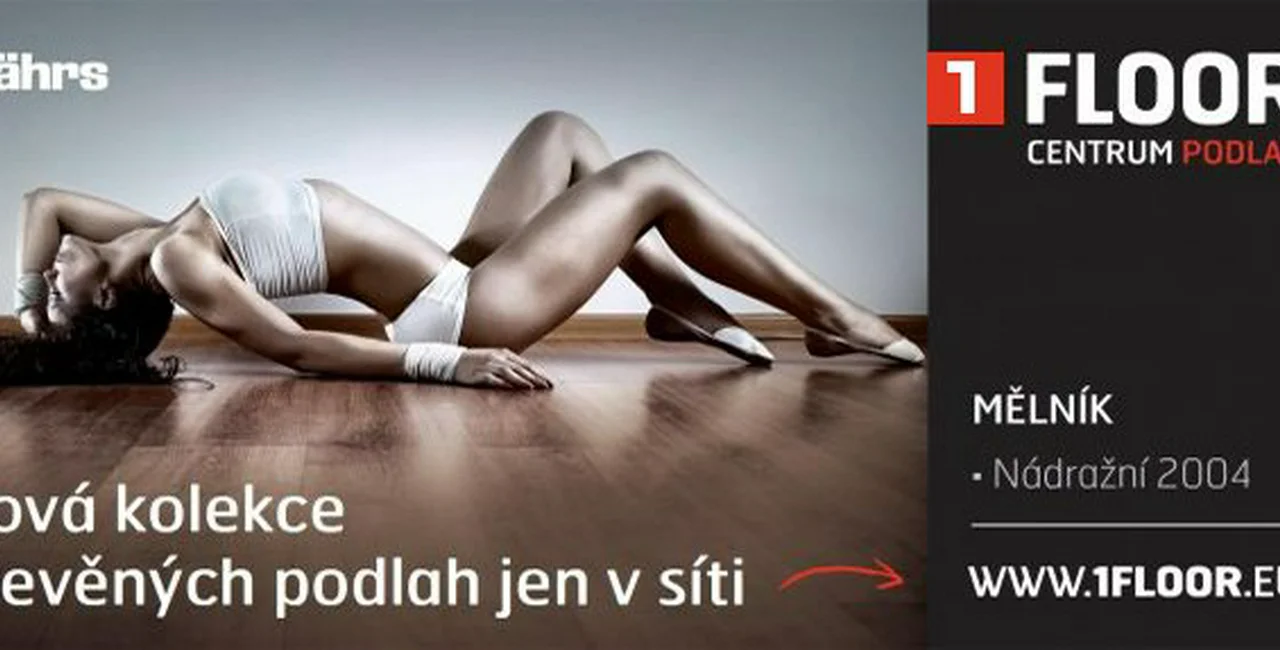There’s an episode of the hit US TV show Mad Men where Peggy tries to convince boss Don Draper that her idea for an advertising campaign will work by parroting the dictum “sex sells.”
Don disagrees. “Just so you know, the people who talk that way think monkeys can do this.”
Don Draper may be a brilliant ad man, but he inhabits a fictional 1960s New York. Perhaps if he were trying to sell beer, scaffolding, or even carp in 21st century Prague, he might get a couple of scantily clad hotties to drape themselves over the product in question and print a cheesy strapline across their crotches.
The sheer quantity of adverts in the Czech Republic where babes show off their buns, boobs, and other body parts in the name of product promotion is overwhelming. It’s something which outsiders like myself can’t help being struck by, like the porno mags widely displayed at eye level – i.e., in view of children – in most newsagents.
You could say all this is just a reflection of the more relaxed attitude Czechs have to nudity. Any Brit who’s braved the communal changing room of the gym or swimming pool here has had to face their inner prude: while we’d much rather hide away in a cubicle or behind a towel, Czechs are more than comfortable stripping off in front of strangers. And once summer arrives, there’s the poolside topless sunbathing. The naturist movement is popular here too, suggesting that Czech Republic is a nation of people who are comfortable in their own skin – literally.
Whether it’s a consequence of political correctness or old-fashioned prudery, perhaps foreigners who object to too much flesh in ads are just uptight. Just look at Ukrainian activists Femen. Rather than burn their bras, these Slavic beauties have bared their chests to draw attention to the exploitation of women in the sex industry or the misogyny of the Catholic Church. These days, even feminists go topless to get their message across.
However, the existence of the Sexistické prasátečko or “Sexist Piggie” Awards shows that there are Czechs who are just as irked by the prevalence of women in skimpy panties – or even less – in advertising. The competition, which has been running since 2009, is designed to highlight offensive gender stereotyping of all kinds. Members of the public submit examples of dodgy ads, a shortlist of the worst offenders is compiled, and then the overall ‘winner’ is decided by online vote. “Every year the number of nominated commercials in the contest is increasing ,from which we conclude that people are beginning to have an interest in the topic of sexism,” says Petra Havlíková of Ženská práva, the women’s rights group responsible for organising the contest.
Surprisingly, perhaps, last year’s winning advert starred a man – or rather a teenage boy about to lose his virginity. Komerční banka’s 2011 campaign featured an androgynous young guy, eyes closed in orgasmic rapture, reclining next to the slogan, “Užij si první bankovní styk”: “Enjoy your first contact with the bank.”
How many of you have ever received such good customer service at your local branch that you almost climaxed?
I thought not.
Last year’s nominees for a Sexistické prasátečko also included a promotional calendar by Mountfield where Miss December rides a lawnmower without so much as a Santa hat on, as well as a billboard ad for a building supplies firm where a naked woman clutches her breasts while saying, “Erect it yourself as well.”
Sex may sell, but it seems subtlety doesn’t.
It could be said that such simplistic gender stereotyping just reflects the fact that relations between Czech men and women remain unequal. Without meaning to sound flippant, I’m sure I’m not the only lady expat who has often found herself wondering whether feminism ever made it this far east. There, I said it: the F word. And there’s the problem. Whatever your nationality, it’s practically impossible to use phrases like ‘women’s rights’ or ‘gender stereotyping’ without being dismissed as a hairy-legged harridan who’s had a sense of humor bypass.
In fact, when I see a billboard displaying a female astride a horse with her torso clad in armour, brandishing an impossibly large sword, while showing off her bare behind (the product being promoted? Recycling Services) my reaction is more likely to be laughter rather than outrage. Dismissing these unsophisticated adverts with a chuckle is one coping strategy, but is it the right one?
Much depends on context. My Czech partner works with a small civil engineering firm in Prague. A promotional calendar from a flooring company ended up displayed on the wall of the office featuring, yes, you guessed it, the obligatory naked girl. So far, so typical. Except that this girl didn’t have so much as a G-string to cover her modesty.
That’s not the punchline. It gets better – or should I say worse.
The office was expecting a visit from a prospective client who happened to be English. And female. My partner suggested to his colleagues that having a Playboy centrefold on display wasn’t typical in a British professional environment. Perhaps they could take it down?
The calendar remained on the wall. However, a compromise was found. For the duration of the visit, they turned the offending image the other way.
I used to think this anecdote was a hilarious example of cultural differences. As I write this though now, I can’t help wondering how I would feel if I had to sit at a computer with a naked woman’s crotch hanging above my head all day – even if it were a two-dimensional one. Depressed? Demoralised? Would I be brave enough to take it down? Difficult to say.
This dilemma leads me to my next question: why don’t more people object to these images?
“[They] feel that they cannot do anything against them,” says Petra Havlíková, one of the organisers behind the Sexistické prasátečko contest. “Generally, the Czechs are not a civically active nation, although this is gradually changing.”
Before we condemn Czechs for their apathetic nature, we should ask ourselves whether there’s any real point in protesting. In an age where we’ve all become sophisticated consumers of numerous kinds of multiplatform media, clichéd adverts where the nubile hotties have scant connection to the products they supposedly promote look amateurish and absurd. Surely, therefore, they are doomed to fail? If these adverts only succeed in making the firm they supposedly promote look ridiculous, then why waste energy objecting to them?
In any case, even if Czechs did want to complain, the country’s Advertising Standards Authority lacks real teeth. The body’s British counterpart recently responded to an influx of complaints by banning a Ryan Air newspaper advert which depicted one of its air hostesses in skimpy underwear tugging at her panties invitingly. A lot of fuss over a little lingerie? The British media thought otherwise and made the ban big news, giving the budget airline infinitely more publicity than the original advertising campaign could have. A complete ban, in other words, was ultimately counterproductive.
Perhaps harnessing the power of the internet to poke fun at lame adverts, as the Sexist Piggie Awards have done, is ultimately the best strategy. Laughter may be the most powerful weapon against crass stereotyping after all. At least then no one can accuse you of being a sour-faced feminist – although perhaps it is time I learned how to operate a power drill.
Related articles












 Reading time: 6 minutes
Reading time: 6 minutes 









































